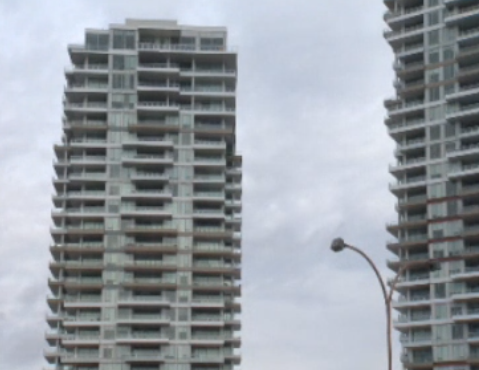Downtown Kelowna, B.C., is home to a number of highrises with the majority of them popping up in recent years.

And while that’s helped boost the housing supply in the Central Okanagan city, a quick search on the vacation rental website, Airbnb, shows that many of the units in these towers are used for short term rentals.
It’s a situation that has taken away badly-needed homes amid the current housing crisis.
“We know from from our calculations that we have about 2,400 units within our community that are used or potentially used for short-term rentals,” Kelowna Mayor Tom Dyas told Global News.
In order to increase the housing supply, the provincial government is cracking down on short-term rental units.
It is putting in place new legislation that will only allow short term rentals in principle residences.
“This is something that is happening provincially here but we also see happening more on a national level with other cities across the country looking at making these changes,” Dyas said.
Dyas is confident the new rules will have the desired effect, pointing to what happened in New York City as an example.
“Reports from out of New York with regards to when they changed their rules and regulations on short-term rentals, it had an immediate impact on that city,” Dyas said. “So I am certain, when things get done, there’ll be an immediate impact on this city also.”
With supply going up, Dyas is also hopeful that it addresses skyrocketing housing costs
“That would be the goal because of the availability of units that are now there for long-term rentals that cost would come down,” he said.

More housing, including the affordable kind, just can’t be built fast enough.
“People are crying on the phone when they talk to us,” said Ken Zeitner, executive director for the Society of Hope. “It’s a tragedy.”

Get daily National news
The Society of Hope, which provides affordable housing, is currently constructing a 122-unit building along Benvoulin Road near Springfield Road along with a 70-plus unit complex in downtown Kelowna.
Zeitner is applauding the government for its latest measure to tackle the crisis.
“We have to try different approaches,” Zeitner said. “There is not one single way that we can solve all of this. We know we need to build more housing. We know that we need to find ways to deal with those units that have been removed from the housing market, so it will be interesting to see how it unfolds. I am hopeful that it will help.”
Especially in a place like Kelowna, to which so many people migrate and where growth is far exceeding home construction.
According to Statistics Canada, greater Kelowna’s population grew by 14 per cent from 2016 to 2021, the fastest rate of growth in all of Canada.
That growth is expected to continue, with the population projected to increase by 40,000 in the next 17 to 18 years.
It means a lot more housing will be needed.
Vacation rental company Airbnb has weighed in on the new rules expressing disappointment.
“The B.C. government’s proposed legislation won’t alleviate the province’s housing concerns, instead it will take money out of the pockets of British Columbians, make travel more unaffordable for millions of residents who travel within B.C., and reduce tourism spending in communities where hosts are often the only providers of local accommodations,” stated Alex Howell, policy manager with Airbnb in Canada.
“As outlined in a report by the Conference Board of Canada, short-term rental rules are not an effective solution to local housing concerns.”
Howell also added,. “We hope the B.C. government will pursue more sensible regulation and listen to the many residents — hosts, travellers and businesses — that will be impacted by the proposed rules.”
Those caught breaking the new rules will be issued hefty penalties.
“The fines are substantially large. They can be $1,000 to $3,000 on a daily basis, with respect to the fines the province has implemented,” Dyas said.
“Now the municipalities will look at going back and putting their own bylaws, a set of these rules but they’ll have that baseline that the province has put in place and they can decide to stay to that baseline or you know, be above that baseline.”
The new rules go into effect by spring of next year.









Comments
Want to discuss? Please read our Commenting Policy first.